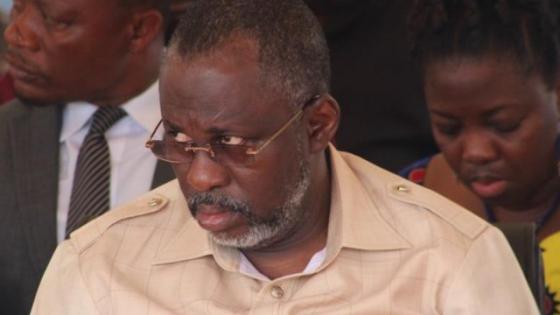Pres. Weah to Fire Officials?

Nathaniel McGill, minister of state. Photo: Zeze Ballah.
… Min. McGill Says So
President George Weah is expected to carry out sweeping changes at several government agencies and ministries upon his return from the UN COP26 summit in Glasgow, Scotland.
The flurry of changes, which the Minister of State for Presidential Affairs Nathaniel McGill has announced, is intended to punish officials whom he claimed have reneged on providing information or reports intended to help the Weah-led government get another chance at the coveted Millennium Challenge Corporation (MCC) grant.
The MCC grant, which could be around US$500 million if finally approved, is needed badly by the Weah government to fund its ambitious road and infrastructure development drive under the national development roadmap -- the Pro-Poor Agenda for Prosperity and Development.
Min. McGill disclosed that the Weah administration will no longer tolerate those who continue to work against its interest but are not willing to leave so that others prepared and ready to work can take over and perform.
“We are going for a cabinet retreat very soon and I have communicated with the President for strong and drastic action to be taken to deter others from being negligent and thoughtless of their responsibilities they have to the country through this government,” Min. McGill added. “We have done well but for little things we could avoid; we will not be successful in the Compact program.”
Although Min. McGill did not name the government officials that are to be affected, he however stated that the meeting will be held on Thanksgiving Day, November 4, a day which has put officials on edge and fueled a growing sense of alarm of who could be next.
“We are having a retreat this Thursday. Those who are causing us the embarrassment of not meeting the Compact criteria may lose their jobs. We are not going to compromise that,” the minister said in an interview with Spoon TV early this week. “When people need to perform, they have to perform. They cannot sit in their closets; have roles to play but not doing, only for the government as a body to take the responsibility for their negligence.”
The MCC, which the country previously secured under then-President Ellen Johnson Sirleaf, came to an end a year ago after five years. It entered into force on January 20, 2016, and ended at midnight on January 20, 2021. All MCC compacts have a fixed 5-year life span, ending on the fifth anniversary after the entry into force of a Compact.
The MCC compact is a foreign aid program that provides beneficiary countries time-bound grants which are targeted at ensuring economic growth, reducing poverty, and strengthening governmental institutions.
The investments of the MCC do not only support a country’s stability and prosperity but also enhance American interests. Liberia has already benefited from the MCC Assistance and Investments that led to about US$257 million that was spent on the rebuilding of the country’s war-ravaged electricity utility system.
Every year each MCC candidate country receives a scorecard assessing performance in three policy categories: Ruling Justly, Investing in People, and Encouraging Economic Freedom.
In its FY2021 scorecard, Liberia failed to reach the 50% threshold, passing only nine out of 20 indicators. The highest marks this time were earned in the Ruling Justly category (5 out of 6 indicators passed), followed by Economic freedom (3 out of 8 indicators passed). Liberia performed poorly in the category of investing in People, passing in only 1 out of 6 indicators.
During FY2018, FY2017, and FY2016, Liberia did achieve the threshold of 10 out of 20 indicators passed.
The Minister’s position comes two months after he led a delegation to the U.S. to lobby the American government and Congress for a new compact grant, as well as explore greater opportunities that could positively enhance Liberia’s visibility in the U.S. political, corporate, and social arenas.
But while in the US, Min. McGill said a close confidante in Washington D.C. and even the head of the program have informed him that due to the lack of the availability of some information about the performance of certain government entities, Liberia will not be considered.
McGill did not name the particular ministry or government agency responsible for not providing whatever information needed to have qualified Liberia for a second consideration after the era of former President Ellen Johnson Sirleaf but emphasized that serious action will be taken to prove that no one is a sacred cow in Weah’s cabinet.
“When the Liberian people are complaining that we are not doing certain things, they have a reason to complain. They know that their President loves them and he is working for them but the thing is that the President cannot do everything,” he disclosed. “This is why he brought in individuals who must help to do some other things. Ministers who have junior cabinet members not doing their job will have to act. There are many other Liberians out there who are qualified to do the job.”
Meanwhile, Min. McGill had sounded upbeat that if the government does not pass this year’s criteria of the compact, they will do so next year.
His ambition, he said, is being backed by the information he obtained from his source at the MCC that the government has done well, although “there are issues we should have settled by now”.
“We came close to passing but some entities in our governance structure led us to this path. We are taking blames, not shifting them on anyone else,” McGill added.
